
Picking an ecommerce platform feels like one of the biggest decisions you can make for your online business. Floating near the top of the list is BigCommerce, a big-name platform that powers everyone from fast-growing startups to giants like Ben & Jerry's and Skullcandy. But with so many choices out there, how do you know if it's actually the right one for you?
That's what we're here for. This is a no-fluff BigCommerce review for 2025. We're going to dig into its key features, make sense of its pricing, check out its new AI tools, and weigh the pros and cons you'll see across countless user reviews. The goal is to give you a straight answer so you can decide if BigCommerce is where you want to build or grow your business.
What is BigCommerce?
In short, BigCommerce is a hosted, all-in-one ecommerce solution. You pay a monthly fee, and in return, you get everything you need to build and manage an online store, including the website hosting, design tools, and a ton of sales features. You don't have to stress about finding your own hosting or dealing with server security because BigCommerce handles all that behind the scenes.
The company follows an "Open SaaS" model, which is their way of saying they try to offer the best of both worlds: it's easy to use but also super flexible. It comes loaded with built-in features right from the start, but also gives you the freedom to connect with thousands of other apps and services if you need to. This makes it a serious option for businesses with unique needs or big plans for growth, serving everyone from small shops on its basic plans to huge companies using its Enterprise-level tools.
A BigCommerce review of its features: What's under the hood?
Alright, let's get into the nitty-gritty. BigCommerce is loaded with features, but just like any platform, it has its high points and its quirks. Here’s a closer look at what you’re actually working with.
Storefront design and customization
Getting your store to look and feel right is a top priority, and BigCommerce gives you a couple of ways to do it. Their marketplace has a bunch of themes to get you started,right now there are 12 free ones and over 200 paid themes that cost between $150 and $400.
But here’s one of the first common gripes you’ll see in reviews: a lot of the free themes feel suspiciously similar, almost like they're just different color palettes of the same design. If you're starting on a tight budget, that can feel pretty restrictive.
Once you pick a theme, you’ll use the drag-and-drop Page Builder to customize it. This lets you add and move around different elements like text boxes, images, and product carousels. It’s helpful, but several reviews from experts point out that it’s not as smooth or intuitive as what you'd find on Shopify. Another specific complaint that pops up a lot is the tiny selection of fonts in the free themes, which makes it tough to match your store’s look to your brand without getting your hands dirty with code.
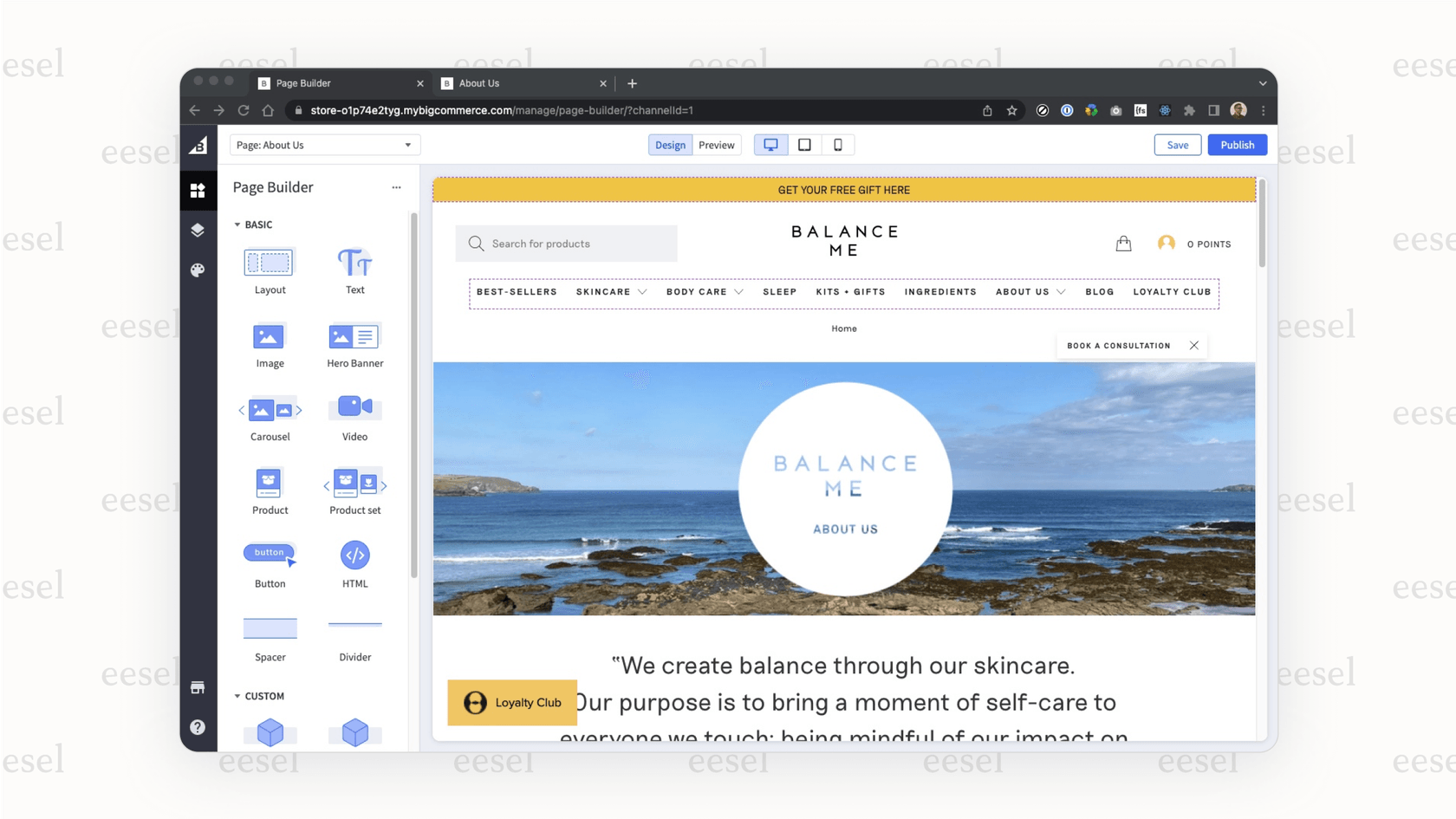
Product and inventory management
Okay, this is where BigCommerce really starts to pull ahead of the pack. On every single plan, even the cheapest one, you can sell an unlimited number of products. That's a huge deal for growing stores.
The platform’s real superpower, though, is how it handles product options, or "variants." You can create up to 600 variants for a single product. For comparison, Shopify's limit is 100. If you sell anything with lots of options,like t-shirts in ten sizes and twenty colors, or furniture with different wood finishes,this feature alone could make BigCommerce your best friend. It lets you manage a complicated inventory without needing weird workarounds or expensive add-on apps.
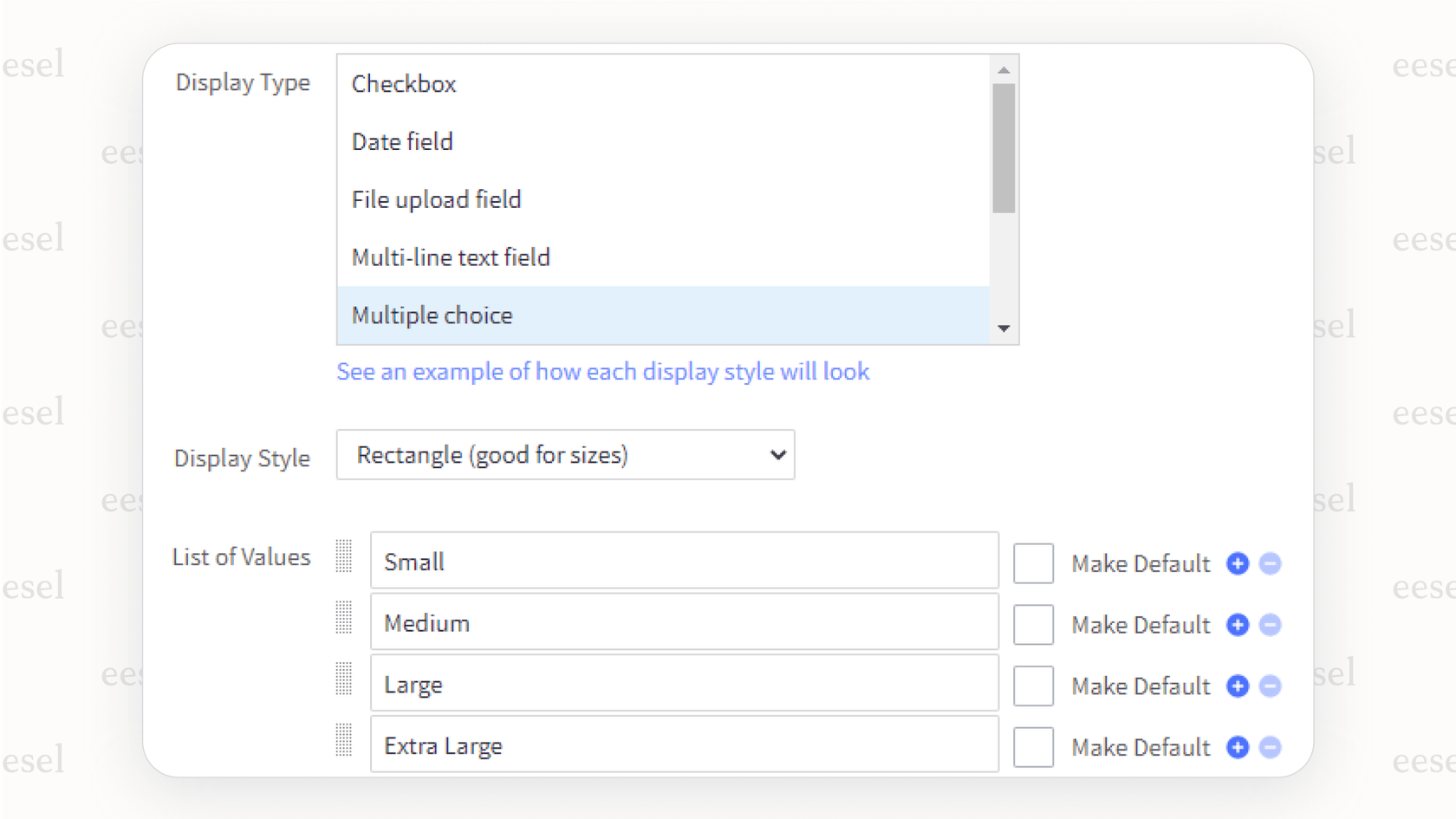
Plus, simple things like creating custom fields for product personalization (think text for an engraving) or letting customers upload a file (like a logo for a custom hat) are built right in. On other platforms, you'd probably need to hire a developer or install another app to do that, but BigCommerce makes it surprisingly easy.
Sales channels and marketing tools
These days, you have to sell where your customers hang out. BigCommerce gets this and offers some solid multi-channel selling tools. It has built-in integrations for big marketplaces and social media sites like Amazon, eBay, Instagram, and TikTok, so you can manage all your listings and inventory from one place.
The platform also gets a lot of praise for its built-in Search Engine Optimization (SEO) features. You get full control to edit your page titles, meta descriptions, and URLs to help you rank better in Google search results. Even better, BigCommerce automatically creates 301 redirects if you ever change a product's URL, which is a small but critical detail for protecting your search rankings and keeping customers happy.
Here's a big "but," though. The Abandoned Cart Saver tool, which is an absolute must-have for winning back lost sales, is only available on the Plus plan ($105/month) or higher. That’s a real bummer, especially since its main rival, Shopify, includes this feature on its cheapest plan.
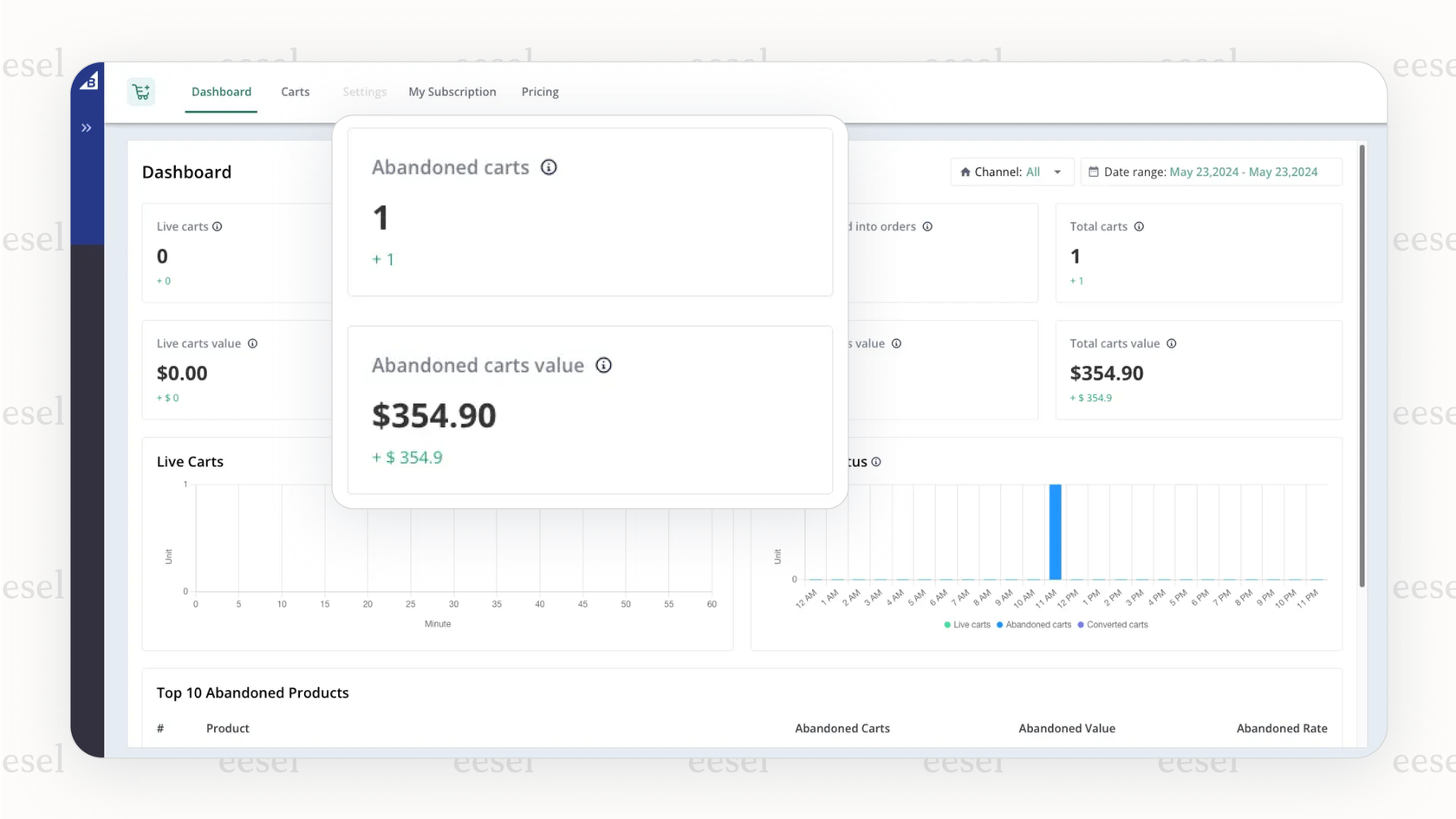
Review of BigCommerce AI ecosystem (and what’s missing)
BigCommerce has recently rolled out its "BigAI" initiative, using Google Cloud's AI to add some smarts to your store. This includes some pretty cool built-in tools. For example, the BigAI Copywriter can help you whip up SEO-friendly product descriptions in a flash. Jason Cadden of Smoky Mountain Knife Works even said, "BigAI Copywriter has allowed us to provide well worded, lengthy, SEO-friendly product descriptions on a large scale." You also get AI-powered search and product recommendations to show shoppers more relevant stuff.
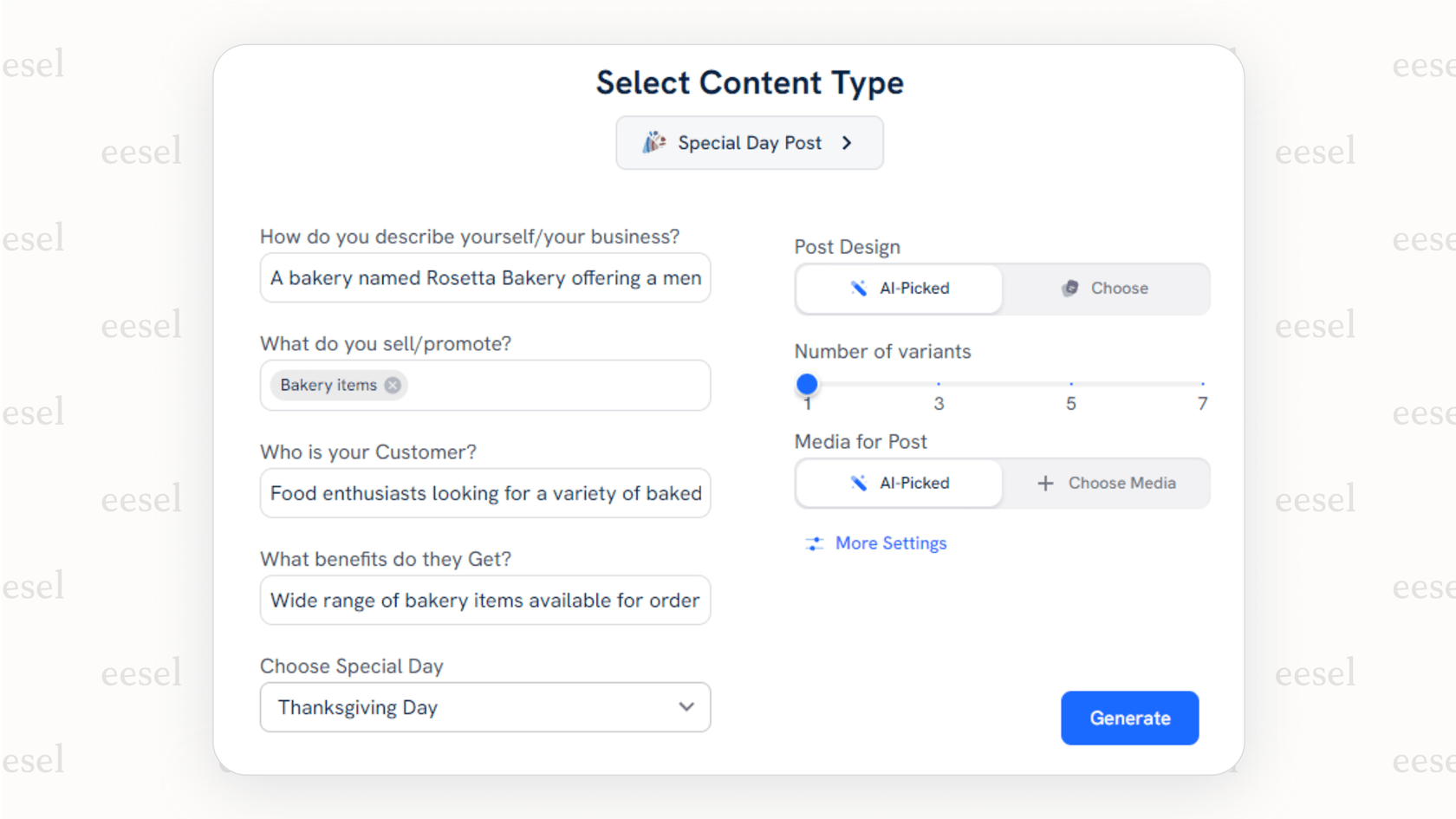
But here’s the thing: these tools are almost entirely focused on the storefront. They’re great for getting customers in the virtual door and convincing them to buy, but they don't do much to help after the sale is made. This creates a pretty big support gap. Once a customer hits that "buy" button, your support team is on their own, manually answering the same questions over and over about order status, returns, and shipping.
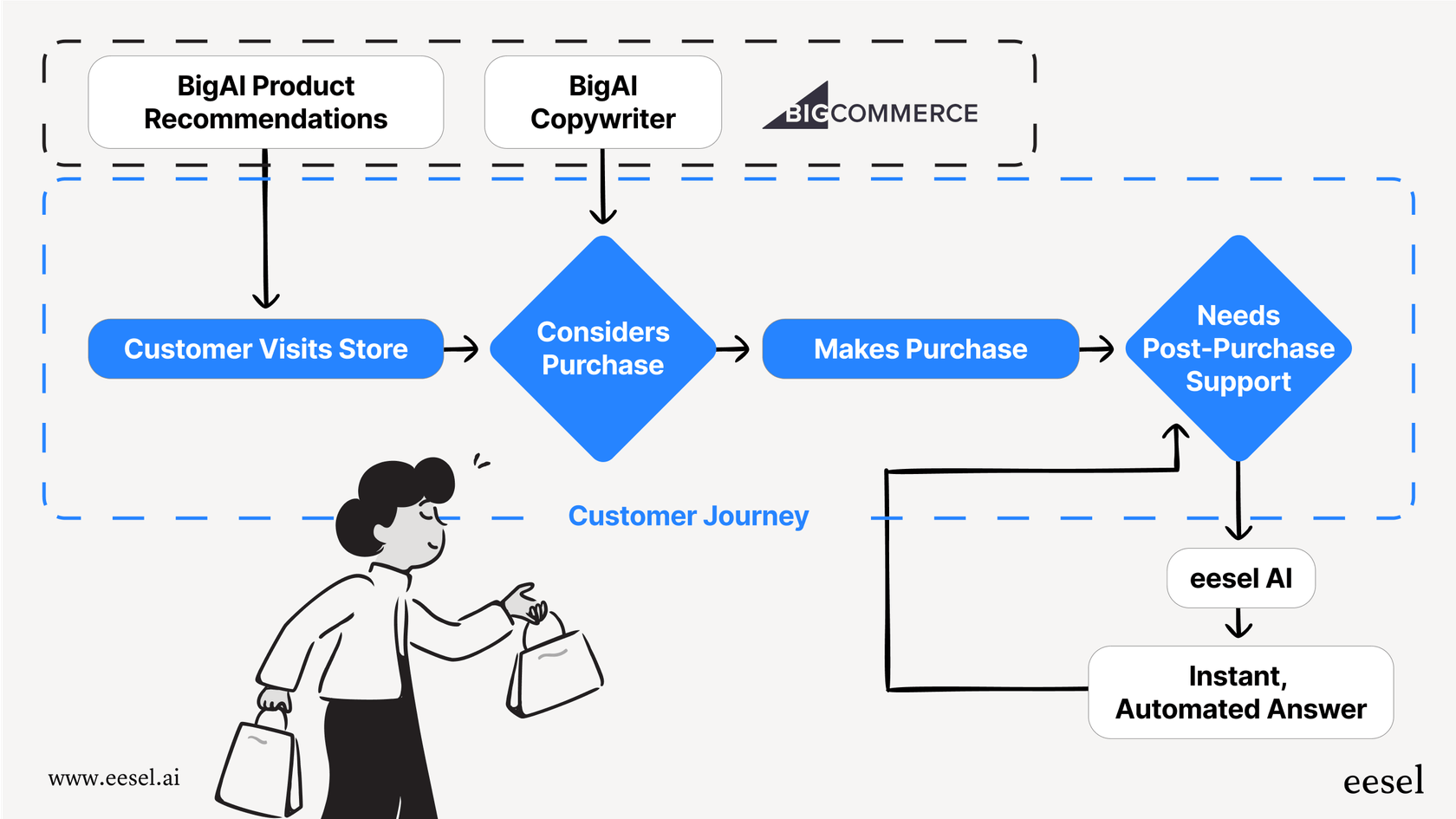
This is exactly why you need a dedicated AI for your customer support. While BigCommerce's built-in AI helps make the sale, a tool like eesel AI picks up where it leaves off. It connects directly with your BigCommerce store and your helpdesk (like Gorgias or Zendesk) to automatically answer all those post-purchase questions. It fills a huge gap that storefront-only AI just wasn't built to handle.
BigCommerce pricing
BigCommerce's pricing is probably its most talked-about feature. The plans are tied to how much you sell each year, a unique approach that can be a blessing or a curse, depending on your business. Let’s break it down.
| Plan | Price (Billed Monthly) | Annual Sales Limit | Key Features |
|---|---|---|---|
| Standard | $39/month | Up to $50k | Unlimited products & staff, multi-channel, real-time shipping quotes |
| Plus | $105/month | Up to $180k | Adds Abandoned Cart Saver, customer groups, stored credit cards |
| Pro | $399/month | Up to $400k | Adds Google Customer Reviews, product filtering |
| Enterprise | Custom | Negotiable | Priority support, custom features, advanced API |
Sales limits and fees
The number one complaint you'll find in user reviews on sites like Trustpilot and G2 is that BigCommerce automatically bumps you to the next plan tier once you cross your annual sales limit. This can give you a nasty surprise in your bill and has frustrated a lot of merchants who feel like they're being punished for growing their business.
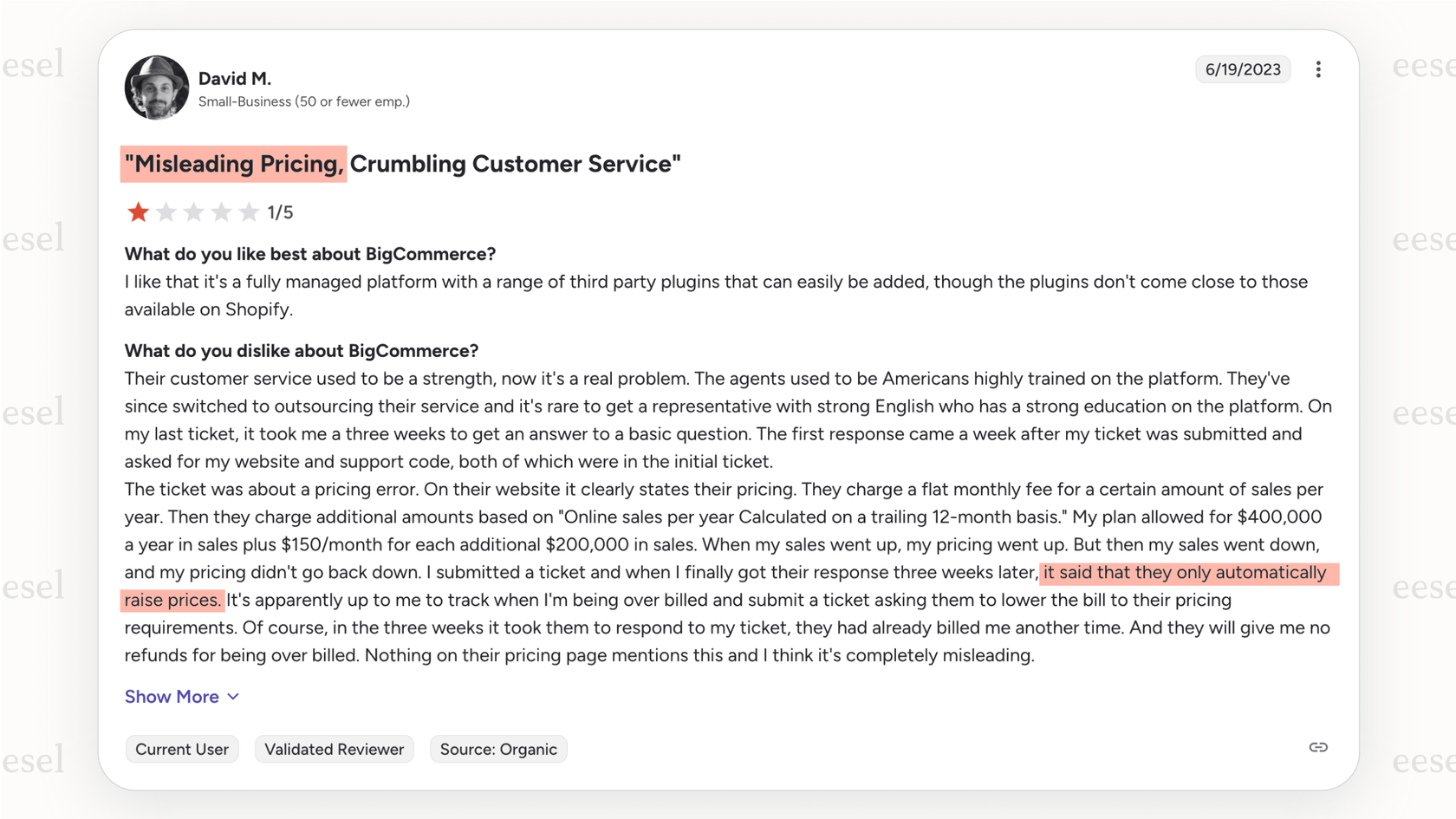
On the other hand, BigCommerce has a massive advantage: it charges zero platform transaction fees, even if you use a third-party payment gateway like PayPal or Stripe. This is a huge difference from Shopify, which can tack on up to 2% in fees on top of credit card charges unless you use their in-house Shopify Payments. Over a year, this can save you a serious amount of money. Just remember, you'll still pay the standard credit card processing fees from your payment provider, which usually hover around 2-3% per transaction.
Which BigCommerce plan is right for you?
- Standard: Perfect for new businesses just getting started, as long as you can live without the abandoned cart recovery feature for a while.
- Plus: This is the sweet spot for most growing businesses. Getting the Abandoned Cart Saver tool is often worth the price jump from the Standard plan all by itself.
- Pro & Enterprise: Built for big, high-volume businesses that need advanced tools like product filtering, higher API limits for custom development, and dedicated support.
Pros and cons of BigCommerce
After digging through tons of expert and user reviews, a pretty clear picture of BigCommerce's good and bad sides comes into focus. Here’s a quick summary to help you sort it all out.
The pros of using BigCommerce
- No transaction fees: This is a huge money-saver, especially as your store grows. You get to keep more of your revenue.
- Great built-in features: BigCommerce gives you more powerful tools from the start, like real-time shipping quotes on all plans, which means you'll rely less on paid apps.
- Unbeatable product options: With a 600-variant limit per product, it’s the clear winner for stores with complex and highly customizable items.
- Strong SEO tools: It comes with a solid set of built-in SEO features that give you the control you need to rank well in search engines.
- Built to scale: The platform is designed to grow with you, offering powerful features for B2B, international selling, and enterprise-level businesses.
The cons and customer complaints
- Forced plan upgrades: The policy of automatically upgrading your plan based on revenue is easily the biggest and most common complaint from users.
- A bit clunky for beginners: The dashboard and page editor are often described as less user-friendly and having a steeper learning curve compared to platforms like Shopify.
- Limited free themes: The selection of free themes is small, and many of them are criticized for looking too much alike.
- Hit-or-miss customer support: Although 24/7 support is advertised, many users on sites like Trustpilot report frustrating experiences, especially when dealing with billing problems or needing technical help.
- The AI support gap: The platform's AI tools are great for making sales but offer no help for automating customer support after the purchase is made.
Build a complete AI strategy for your BigCommerce store
A good ecommerce strategy has to think about the entire customer journey, not just the path to the checkout page. While BigCommerce's AI does a great job of getting your store ready for conversions, it leaves your support team to clean up the mess afterward. That can create a disjointed experience where a smooth purchase is followed by slow, repetitive support questions.
The best approach pairs BigCommerce's sales-focused AI with a dedicated support automation platform. This is where eesel AI slots in perfectly, acting as the AI brain for your support team. It connects directly with BigCommerce to pull live order info and learns from your past support tickets and help docs to automatically resolve over 70% of common questions. eesel’s AI Agent can work right inside your helpdesk, while the AI Chatbot provides instant, 24/7 answers on your site. This way, your customers feel supported every step of the way.
Learn how eesel AI can boost your online store to a whole new-level. Book a demo or start a free trial today!
Frequently asked questions
Yes, this is a major point to consider. BigCommerce automatically moves you to the next plan tier when your annual sales exceed your current plan's limit, which can lead to unexpected costs as your business grows.
The biggest advantage is that BigCommerce charges zero platform transaction fees on all plans, even with third-party gateways. For stores with significant sales volume, this single feature can save you thousands of dollars per year.
Absolutely. With the ability to create up to 600 variants for a single product, BigCommerce leads the industry for complex inventories. This built-in strength often removes the need for expensive or clunky third-party apps.
While it is more complex than some rivals, it's not impossible for beginners. Just be prepared to spend extra time learning the interface, as its powerful features mean the dashboard can feel less intuitive at first glance.
BigCommerce is known for having very strong built-in SEO tools. It gives you full control over URLs, page titles, and meta descriptions right from the start, providing a solid foundation to rank well in search engines.
The platform's native AI is designed to help with sales and marketing, like writing product descriptions. It is not built to handle post-purchase support tasks like tracking orders or processing returns, creating a gap that requires a specialized support AI.
Share this post

Article by
Kenneth Pangan
Writer and marketer for over ten years, Kenneth Pangan splits his time between history, politics, and art with plenty of interruptions from his dogs demanding attention.






